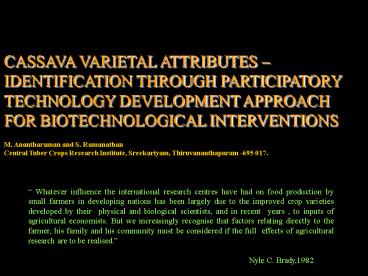CASSAVA VARIETAL ATTRIBUTES - PowerPoint PPT Presentation
1 / 37
Title:
CASSAVA VARIETAL ATTRIBUTES
Description:
Size, Shape, Starch, Uniformity, Number, Market, Value, Yield, Non fibrous, Hardy stems ... Rainfed Plains and Hill Agriculture (Andhra Pradesh) ... – PowerPoint PPT presentation
Number of Views:645
Avg rating:3.0/5.0
Title: CASSAVA VARIETAL ATTRIBUTES
1
CASSAVA VARIETAL ATTRIBUTES IDENTIFICATION
THROUGH PARTICIPATORY TECHNOLOGY DEVELOPMENT
APPROACH FOR BIOTECHNOLOGICAL INTERVENTIONS
M. Anantharaman and S. Ramanathan Central Tuber
Crops Research Institute, Sreekariyam,
Thiruvananthapuram -695 017.
Whatever influence the international research
centres have had on food production by small
farmers in developing nations has been largely
due to the improved crop varieties developed by
their physical and biological scientists, and in
recent years , to inputs of agricultural
economists. But we increasingly recognise that
factors relating directly to the farmer, his
family and his community must be considered if
the full effects of agricultural research are to
be realised. Nyle C. Brady,1982
2
GREETINGS FROM CASSAVA FARMERS OF INDIA
3
Cassava Variety Attributes
4
Methodology followed Production System and the
methods used
5
Map showing the location of OFTs implemented
under the project
- 1. Chenkal -Trivandrum dt.
- 2. Anacode - Trivandrum dt.
- 3. Chinaparakudi Idukki dt
- 4. Puthiragoundanpalayam
- 5. Thengottupatti
- 6. Uppalapadu
- 7
- 7. Yelamalakota
- 6
- 5
- 4
- 3
- 2
- 1
6
Low land production system Village Anacode (
Kerala)
7
Matrix ranking of the crops
8
Low land production system Village Anacode (
Kerala) Evaluation
9
Low land production system Village Anacode (
Kerala) Positive and negative characters of
cassava varieties
10
Low land production system Village Anacode (
Kerala) Evaluation on cooking quality
11
Low land production system Village Anacode
(Kerala) IOFT Rank order of cassava varieties
based on evaluation of the tubers by the
scientists and user system
Degree of agreement Scientists Farmers
0.35NS, Scientists Traders 0.15NS
Scientist Farm women 0.09 Farmers Traders
0.65 Farmers Farm women 0.55 Traders
Farm women 0.82
12
Low land production system Village Anacode
(Kerala)
Matrix ranking of cassava varieties by
farmers( COFT)
13
Low land production system Village Anacode
(Kerala) Validation trials
14
Upland production system Village Chenkal
(Kerala)
15
Upland production system Village Chenkal
(Kerala) Matrix ranking of Confirmation On
Farm Trials varieties Chenkal village
16
Hill Agriculture Village Chinnaparakudi (Kerala)
17
Hill Agriculture Village Chinnaparakudi (Kerala)
Cassava Diversity
18
Hill Agriculture Village Chinnaparakudi
(Kerala) Drying of Cassava chips
19
Hill Agriculture Village Chinnaparakudi
(Kerala)
Evaluation of cassava tubers
20
Hill Agriculture Village Chinnaparakudi (Kerala)
Evaluation of cooking quality
21
Hill Agriculture - COFT Village Chinnaparakudi
(Kerala) Assessment of varieties on various
characters
G - good M - Medium
22
Irrigated Production system (Tamil Nadu)
23
Irrigated Production system (Tamil
Nadu) Observation on Crop stand ( one month)
attributes as perceived by the farmers
24
Irrigated Production system (Tamil Nadu)
Laying out of OFT
25
Irrigated Production system (Tamil Nadu)
Evaluation of cassava tubers
26
Irrigated Production system Puthiragondanpalayam
(Tamil Nadu - COFT)
27
Hill Agriculture - Rainfed Kolli Hills (Tamil
Nadu)
28
Hill Agriculture - Rainfed (Tamil Nadu)
29
Hill Agriculture - Rainfed (Tamil Nadu)
Positive and negative aspects of varieties as
perceived by tribal farmers
30
Rainfed Plains and Hill Agriculture (Andhra
Pradesh)
31
Rainfed Plains and Hill Agriculture (Andhra
Pradesh)
32
Production system wise identified cassava
Varieties
33
Cassava Varietal Attributes for various
Production Systems With varieties identified
Plains rainfed Hill rainfed
Irrigated
Hill Rainfed
Upland rainfed
Hill Rainfed
Chip making Taste-bitter, Par boiling
Taste, medium size tubers, short duration,
CMD tolerance, non-lodging
Starch, peelability, colour,
robust stems
Short duration, drought tolerance, colour, starch
Starch,short duration, Colour, peelability,
Drought/ CMD tolerance
CMD tolerance, Medium size uniform tubers,taste
CI 731, H-97, H-1687
H-226, H-165
CI-731, CI-649, CI-732
H-165, S-856
CI 732
H-165, CI-649
34
BIOTECHNOLOGICAL INTERVENTIONS 1. RAPID and
MASS MULTIPLICATION OF PLANTING MATERIALS 2.
ACHIEVING VARIETIES WITH DESIRABLE ATTRIBUTES
35
It is now clear that community managed food and
nutrition security systems are the most
effective in achieving freedom from hunger and in
ensuring sustainability through low transaction
costs and replicability M.S.
Swaminathan
36
THANKS
37
THANKS































